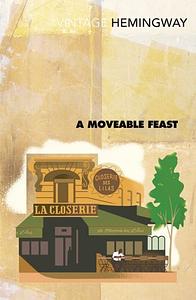Take a photo of a barcode or cover
Interspersed in this beautiful tribute and memoir, Hemingway's advice on the craft of writing shines ever as bright. There's sincere conversation about craft and what it means and takes to be a craftsman. The chapter on Dostoevsky was entirely too relatable; I'm sure more readers of the literary giant felt the same.
Sincerity despite one's intention betrays Hemingway's true nature here though. I'm not sure if I'm to praise him for this or find him lacking in self awareness. Despite his best efforts or perhaps because of them, I'm left with the thought that Ernest Hemingway was a deeply insecure man. Not an insecure artist, which is understandable. He is an insecure man. And I say that with pity more than anything. He is a brave man. He has been to war at a time most people go to college. His life is full of feats of bravery and thrill. But that is the case against him. One can only be brave, one can only be tough- these are the rigid structures he's imprisoned himself in.Vulnerability can only come out at frustration and is to be quickly dismissed. Looking artsy is 'feminine' so he must not look artsy. Yet this memoir is full of him doing 'feminine' stuff. I wonder if he's good friends with Fitzgerald because he didn't suffer those rigid constraints as much as Hemingway did. But one must not shy away from praising his sincerity. Hemingway's advice of 'Write one true sentence that you know' stays intact.
Ця історія - це ніби подорож у часі до Парижа 1920-х років, до міста, що дихає мистецтвом, свободою і пошуком себе. Читати цю книгу — це як дивитись на світ очима самого Хемінгуея, молодого й амбітного письменника, який шукає свій шлях серед кафе, літературних зірок і вузьких паризьких вулиць.
Париж постає не лише містом, а й живим персонажем: сірі дні набережних, шумливі кафе, світло вікон уночі. Це Париж, що чарує, але водночас не приховує своїх гострих кутів. Через його розповіді я відчула, ніби сама опинилася поруч із молодим Ернестом, спостерігаючи, як він сміливо кидається в життя й дружбу з такими ж майбутніми легендами.
Часом книга дещо розмита, деякі епізоди повторюються, але в цьому і є її справжність.
Read–– from September 27th 2022 to October 8th 2022
Rating–– 4/5 stars
“If you are lucky enough to have lived in Paris as a young man, then wherever you go for the rest of your life, it stays with you, for Paris is a moveable feast”
The first Hemingway I’ve had the pleasure of reading and funnily enough I decided to read this book was on a whim. A week prior to starting to read it, I was browsing through the classics section at my local bookshop when I was like “Huh, Ernest Hemingway, should I?” and I did, I bought it and read it a week afterwards, and it was an entertaining ride for sure.
Ernest Hemingway takes us to Paris in the 1920s, in this magical setting, where we see many scenes of other known artists–– such as James Joyce, Picasso and of course, F. Scott Fitzgerald. We get to know them through Hemingway, his perception and opinions of them, and how they shaped his life, but at the same time we get to know Hemingway by reading these glimpses of his early days.
The best way to describe the structure of this book–– is glimpses, these small scenes and fragments of his 20s, that sometimes felt like a stream of consciousness because of the straightforwardness in which Hemingway wrote and how truthful they were written. I felt like I was inside his thoughts, that I could understand him even considering we never really get a perspective/ narration of him as a person, we get to understand him through his little routines, his conversations with others and those little aspects he decided to reflect and describe. It felt intimate and selective, this special privilege of being able to know about him and about them, but before I continue expanding on certain aspects of his portrayals of others, specifically F. Scott. Fitzgerald–– which is probably the most interesting and eye-opening section in this book, I would love to share some of my favorite lines so spoiler alert!
Firstly, this section that its found in the preface of the Vintage Classics Edition
“Some were secrets and some were known by everyone and everyone has written about them and will doubtless write more”
This sentence next to Hemingway’s original foreword to the book––
“This book contains material from the premises of my memory and of my heart. Even if the one has been tampered with and the other does not exist”
Greatly shine how the book is and how it feels, it was an extract of someone’s mind, of someone’s someones, and of someone’s experiences— with its harsh truth, with its prejudice and mistakes, with its joys and sorrows–– sometimes they felt so out of me, they felt crass and harsh but they made someone, and in this case they made Ernest as a writer, which makes me want to dive into more of his writing.
“I’ve seen you, beauty, and you belong to me now, whoever you are waiting for and if i never see you again, I thought. You belong to me and all Paris belongs to me and I belong to this notebook and this pencil.
Then I went back to writing and I entered far into the story and was lost in it. I was writing it now and it was not writing itself and I did not look up nor know anything about the time nor think where I was nor order any more rum St James”.
These two little paragraphs encompass perfectly how this young Hemingway views Paris, and later throughout the book it will explore how Paris impacted him as well as how he saw his writing and how it felt to him to write.
Then, let’s talk about F. Scott Fitzgerald, my thoughts on him are mixed and confusing— though I enjoyed reading The Great Gatsby in the past, the more I discovered more things about him, about his life, his wife and the book sinked in. I like it less and less. But without a doubt, his section of the book was mesmerizing, especially the little paragraph that Heminway wrote before starting his chapter.
“His talent was as natural as the pattern that was made by the dust on a butterfly’s wings. At one time he understood it no more than the butterfly did and he did not know when it was brushed or marre. Later he became conscious of his damaged wings and of their construction and he learned to think and could not fly any more because the love of flight was gone and he could only remember when it had been effortless.”
Oh boy! It is magical, the description–– wow wow, till this day I still think about it. But getting back on his chapter, I definitely appreciate and understand the perception and the picture Ernest paints about Fitzgerald, it is for sure interesting and enlightening, I sound fascinated by his thoughts on Zelda and Scott–– I could talk about them for hours, their marriage is for sure one of talks and what ifs. Hemingway dissects him, his writing, his marriage and more, he paints the picture of the bull (Ernest) and the butterfly (Scott).
A recommended read, specially if you want to know more about the Lost Generation,
‘You are all a génération perdue’
‘That’s what you are. That’s what you all are,’ Miss Stein said. ‘All of you young people who served in the war. You are a lost generation.’
I thought that all generations were lost by something and always had been and always would be…
Oh and of course! watch Midnight in Paris after.


